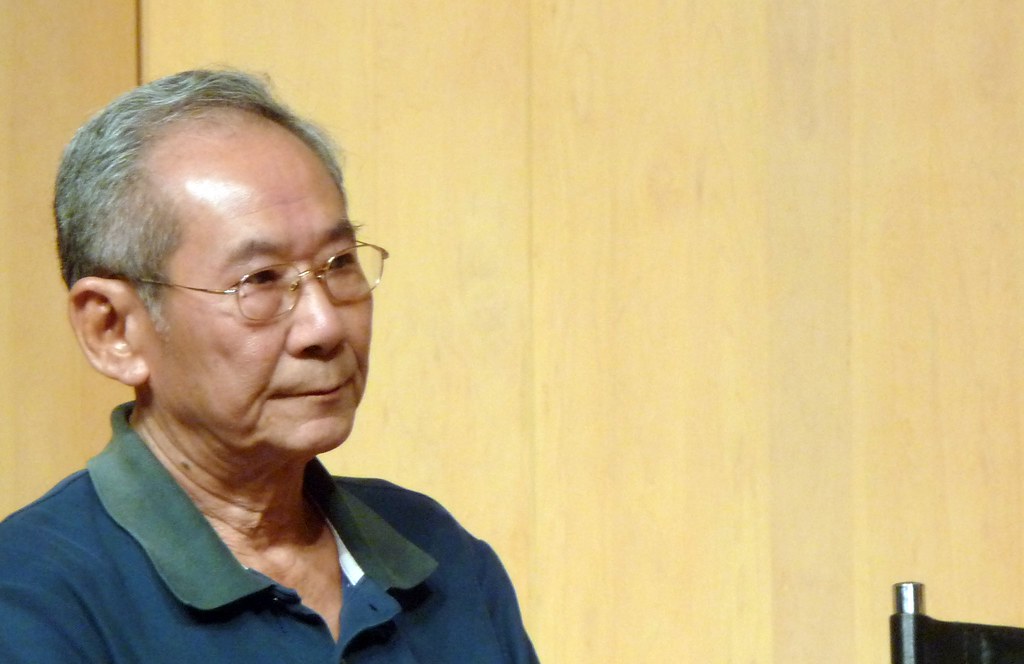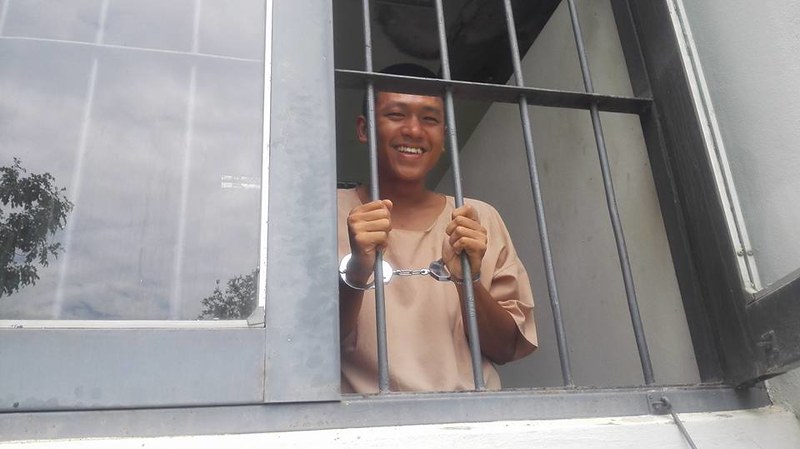"During the past three years, my despair about my country has never reached the depth it did when I learned of the judgment in the case of Pai Dao Din," said Nidhi Eoseewong.

Nidhi Eoseewong (file photo)
Pai is an independent thinker of the new generation. People like him serve as an important force to catalyze positive transformations in society and so are the hope of every country. By locking Pai away, both he and, and in truth, Thai society in general, are forced to sacrifice needlessly. He is imprisoned through the consent of those inside the system and the submission of those outside the system.
Throughout the past three years, I believed that a small, narrow opening remained in Thai society for people to apprehend an alternative politics that differed from the one pressed upon them. Despite significant restraints, it was possible to struggle to move and push forward. This small space prolonged the existence of freedom and human dignity and was also perhaps a point of departure to expand upon in the long run.
The judgment in Pai’s case made me to realize that this small, narrow opening was nothing more than a strategy and tactic set up by those in power. This space does not exist in the service of freedom, but in the service of complete domination.
I am well aware that hopelessness regarding the future of one’s country is an emotion. Further, it is an emotion that they very much wish to plant inside us, because doing so will make their power more secure and sustainable. So, I have gathered all of my wits to comprehend the reasons why we should hang on to our hope, even during a time in which there is no reason to view the world as anything but cruel.
Perhaps because I have spent my entire life interested in history, it is very easy for me to remind myself that the lengths of my lifetime, his lifetime, and their lifetimes, are all very short. They end after a mere few breaths. The changes we hope to see in our country are inevitably a matter of historical time. If they do not occur in our lifetimes, they will occur in those of our children. If they do not occur in our children’s lifetimes, they will occur in those of our grandchildren.
This is especially the case in the present-day era, when the world spins at an increasingly rapid pace.

Jatuphat ‘Pai’ Boonpattararaksa (file photo)
In the late 1880s, how many people in Bangkok thought that the nobility that held power and accrued tremendous benefits from governance would all come to serve the king without any channel for negotiation? But only 20 years later, the descendants of all the noble families, no matter how old or established, all became servants of the crown who received a monthly salary determined solely by the king. No further argument.
Similarly, in the late 1890s, who in Bangkok would have thought that the full and unlimited royal prerogative of the king under the absolutist regime would reach its end less than 35 years in the future?
20 years, 35 years are long periods within the space of an individual’s lifetime, but trivial in terms of history. Time will always be on our side.
History also tells us that no matter what type of political regime, we can rest assured that consent matters. The problem is whose consent matters.
History also tells us that those who hold power, no matter how excessive, must always seek consent from those who have the potential threaten their power. The use of force to slaughter all of those who pose a threat, in addition to being impossible, will negatively affect their power. For example, all large businesspeople have the potential to directly or indirectly oppose those who control the state. But if those who hold power kill or strip businesspeople of their assets, they will only harm themselves. There is no one better to deposit wealth into the national treasury and it will take a long time to cultivate new sources of wealth that will bear the same fruit as the original group. Those in control of the state may die before they become ultra-wealthy.
Who has the potential to become a threat to dictatorial power in Thailand? The answer is the usual suspects who have never had to share power, no matter the type of regime. The military dictatorship already works to keep these people happy. But the group that is more intriguing are new figures who have slowly but surely increased their potential of being a threat during the past decade. These are the common people, or ordinary people.
Even though the number of common people means that they have constituted the mass from antiquity until the present, they have not possessed the capacity to threaten the power of the ruling class. This is because they lack the networks and organization of the ruling class. In addition, they have not had a great necessity to be mixed up with the ruling class, due to their use of economic, social and cultural strategies which keep the power of the ruling class at a distance (such as fleeing to the jungle).
But in our current and transformed modern world, this group may now be unable to avoid the power of the ruling class. A necessity has emerged for them to increasingly deal directly with power, and such dealings have become one of the primary conditions in determining the direction of politics.
Even in the present, the people are gravely politically divided. It is true that one large group of people supported the seizure of power by the military. But it is not all that credible that the large number of the masses that joined with the leaders of the People’s Alliance for Democracy (PAD) and the People’s Democratic Reform Committee (PDRC) were able to create a political movement that resulted in the coup on their own. (The truth behind the movement may not be as they think. But their individual experience makes them think that their collective talent resulted in the coup.) The experience was one that they will never forget. Their chosen political path is similarly unforgettable. Therefore, as long as they go along with the dictatorship, the dictatorship is safe.
They can go along with the dictatorship due to their rift with another group, which also had a similarly unforgettable experience. But no rift anywhere in this world can remain in place eternally. The wound caused by the rift will one day become indistinct. The military will then face the (actual) “great mass of the people.” That day, the force of the weapons and the troops will be unable to keep Thailand motionless in place any longer. What is experienced as a nightmare by one portion of Thais will abate.
I do not mean that we will be back on the path to democracy. Our country may still have to face dictatorship in other forms. But it will have to be a dictatorship that seeks consent from the majority, rather than seeking its surrender.
Pressure from outside cannot prolong this nightmare continue for very long. I am not referring to political pressure from the great powers. Once the Cold War ended, Thailand was no longer significant enough for the great powers to interfere in internal political affairs beyond expressing a stance when a segment of the armed forces launches a coup. Believe me that America is not involved, China is not involved, and Russia is not involved. This is a matter of an internal power struggle among the ruling class in Thailand itself.
But I am referring to the pressure from transformations in technology, thought, culture, economics and society taking place globally. These transformations possess greater violence and speed, and are more far-reaching that the transformations into “modernity’ or westernization into the nineteenth century. The present dictatorial regime of Thailand has regressed too far to be in that world. Such a regime cannot hold on for too long, whether in Thailand or in any other country in the world.
The eternal problem of every autocratic regime in every era is how to pass on power in a stable fashion. Even the monarchy in ancient times, an autocratic regime with precise rules in place for the transfer of power, could not escape fights over the throne, civil wars, inter-state wars, riots, and assassinations when there was a change of dynasty.
You may remember that Thanom Kittikachorn and Praphat Jarusathien had to let go of control over the army in 1972. The subsequent result was 14 October 1973.
In sum, there is no way that the regime which makes Thais hopeless about their own country can remain in power for very long. A new day has to come. I do not know when it will come. I may not see it in my lifetime, but it will definitely come in Pai’s lifetime.
It is merely that the new day may not line up with our hopes (but I am confident that it will be better than today for certain). Pai used his admirable intelligence and courage to make a new day as close to our hopes as possible inevitable. Even though he is behind bars now, he is part of building such a new day. This new day is one in which none of our children and grandchildren will be locked up like Pai.
Note: Jatupat Boonpattaraksa, or Pai Dao Din, is the first person to have been accused and prosecuted for violating Article 112 under Rama X. He was prosecuted for sharing a BBC Thai story about the king’s biography to Facebook in December 2016, an action which over 2600 other people did as well. On 14 August 2017, he was sentenced to 2.5 years in prison, reduced from 5 years as he confessed to the crime. He is currently imprisoned in Khon Kaen, while also undergoing trials in four other cases related to his peaceful expression of dissent.—trans.
Translated by Tyrell Haberkorn.
Prachatai English is an independent, non-profit news outlet committed to covering underreported issues in Thailand, especially about democratization and human rights, despite pressure from the authorities. Your support will ensure that we stay a professional media source and be able to meet the challenges and deliver in-depth reporting.
• Simple steps to support Prachatai English
1. Bank transfer to account “โครงการหนังสือพิมพ์อินเทอร์เน็ต ประชาไท” or “Prachatai Online Newspaper” 091-0-21689-4, Krungthai Bank
2. Or, Transfer money via Paypal, to e-mail address: [email protected], please leave a comment on the transaction as “For Prachatai English”
